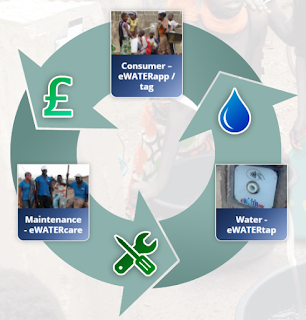NGO's and water management
NGO’s are non-governmental organisations
which are usually non-profit, international organisations. They help many of
the unfortunate who find themselves in tough times, may it be disaster relief
or just living in poverty. These many NGO’s help in various ways, including shelter,
food and medicine. In this blog I will be looking at the ways in which NGO’s
help women in Africa in regards to water and water collection, these NGO’s aim
to promote equality through education.
Zimbabwe gained independence in
1980 and the water supply systems were based on a supply driven approach, rather
than a sustainable approach. It was mainly women who paid the price if distant
water supplies, many of them travelled great distance to obtain water for their
families, and suffered health risks as a result of these travels. In 1993
Zimbabwe undertook a project for water sector reform; they invited women to partake
in the discussions and decisions being made. Four years later a Community-based
Management approach was adopted in Chipinge.
UNICEF (United Nations Children’s
Fund) contributed US$ 4,000 to the RDC (Chipinge Rural District Council) in
2003 to rehabilitate water supply systems, mainly bore holes. This scheme has
been as localised as possible as the community has held workshops for local
sinkers and latrine builders. Women have been encouraged to participate and it’s
them who select the technology that should be used and the site locations. The
initial plan from UNICEF was to rehabilitate 15 boreholes, however, due to the
women’s participation in operation and maintenance 60 boreholes were
rehabilitated.
There are many positive outcomes
from this project, women are given an equal platform to men to voice their opinions
and concerns and are able to do something about it. Girls are able to stay in
school longer as they do not need to collect water from far distances. These boreholes
provide better hygiene and have resulted in a decrease in diarrhoeal disease.
This village will act as a role model for other communities and will be UNICEF’s
success story to encourage other villages to participate in this project.
Although this was a successful
project, there were some obstacles which needed to be dealt with during the
process. Men felt as if their roles were threatened, men tend to be the head of
the households and often disapproved if their wives involving themselves in the
community affairs. UNICEF arranged workshops which helped demonstrate the
importance of both men and women being trained, which helped the men see the
equality between them and their wives. Some men also took to household tasks to
help their wives with their workload. Male disapproval was not the only obstacle
women had to overcome as the traditional dress for a woman is a long dress.
However, in order to work they must wear overalls, which were seen as
inappropriate. Now women can freely wear overalls to work during latrine
construction and repairing of boreholes.
Overall this is a positive
example of NGO’s making significant progress in the inequalities of water in
Africa, as they set up equal opportunities for the women and set up workshops
to educate and encourage this equality. UNICEF saw the problems surrounding
water was mainly impacting women so took them on board in making any decisions
and gave them key roles in the project. If this can be seen and replicated in
other villages across Africa women will have more of a chance at equality and
development.

Hi,
ReplyDeleteThis is a very informative blog post! Although it was a successful project which helped rehabilitate water supply systems in Zimbabwe, I was wondering whether NGOs and its water management can actually help reduce poverty and gender inequalities? As Zimbabwe is one of the poorest countries in the world..
Hi Amandeep,
ReplyDeleteThis is a great example of a project which achieved in garnering actual female agency (as opposed to using female participation as a tokenistic, box-ticking excercise!).
It's interesting that you mention the challenge of male resistance on account of them feeling threatened. I read an interesting paper by Cornwall (2000) which suggests often men are unwilling to engage in gender-participatory projects because they focus a little too much on women, leaving them to feel excluded and thus unwilling to cooperate. This paper was of course published 18 years ago, do you think that this opinion is (or has ever been) the case? The training that UNICEF gave to men and women to see the benefits of gender equality is a wonderful caveat to this argument, but do you think that this approach is widespread enough?